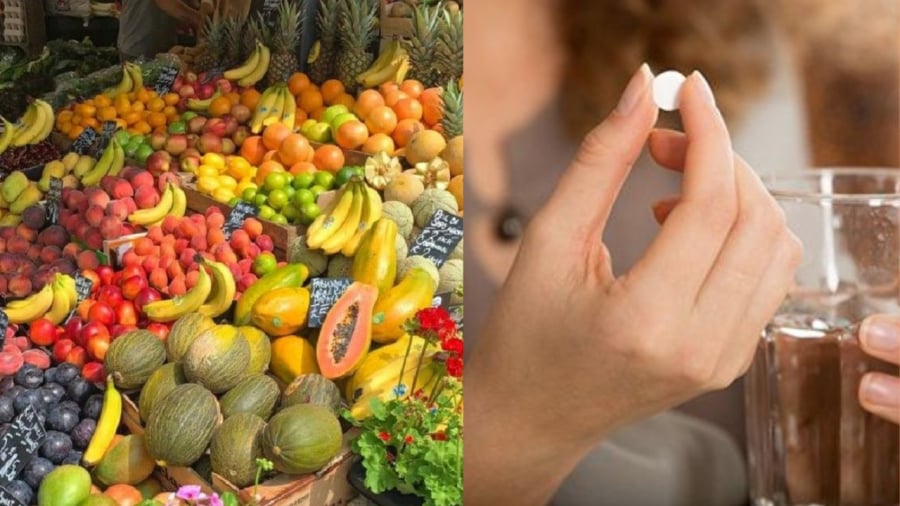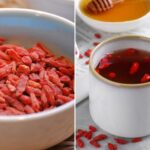Fruit juices are a popular choice for boosting vitamin and mineral intake and strengthening the immune system. However, not all fruit juices are safe to consume alongside prescription medications. Some juices can significantly impact the effectiveness of medications and may even cause harmful side effects when taken together.
Here is a list of 10 fruit juices that you should avoid while taking medication, as warned by nutrition experts:
1. Grapefruit Juice – The Antithesis of Heart and Blood Pressure Medication
Grapefruit contains various bioactive compounds, notably furanocoumarin, which inhibits the enzyme CYP3A4 responsible for drug metabolism in the liver. This inhibition leads to abnormally high drug concentrations in the blood immediately after ingestion, potentially causing serious side effects such as irregular heart rhythms, excessive low blood pressure, or drug toxicity. Individuals undergoing treatment for heart conditions, high blood pressure, lipid disorders, or depression should refrain from drinking grapefruit juice while taking their medication.

2. Orange Juice – Negative Impact on Cholesterol and Osteoporosis Drugs
Oranges may seem like a harmless fruit, but orange juice can increase the concentration of certain drugs in the bloodstream, thereby elevating the risk of liver and muscle damage. Additionally, orange juice reduces the absorption of osteoporosis medications by up to 60% compared to plain water.
3. Lemon and Tangerine Juice – Incompatible with Anti-Inflammatory Medication
Juices from the citrus family, particularly lemon and tangerine, are high in acid content and rich in vitamin C. These components can alter the absorption environment for medications, especially non-steroidal anti-inflammatory drugs (NSAIDs), leading to reduced drug efficacy or increased stomach irritation.
4. Carrot Juice – Interference with Blood Thinners
Carrots contain beta-carotene (a precursor to vitamin A) and vitamin K, both of which can influence the effects of blood-thinning medications like warfarin. Drinking carrot juice while on this medication may decrease or enhance the drug’s action, resulting in uncontrolled treatment outcomes.
5. Grape Juice – Altering Absorption of Immune and Cardiovascular Drugs
Similar to grapefruit, grape juice affects the enzymes responsible for drug metabolism. For individuals taking immunosuppressant drugs like cyclosporine, grape juice can increase drug concentrations, heightening the risk of infections and side effects. It also interferes with the absorption of antifungal and cardiovascular medications.
6. Blueberry Juice – Increased Bleeding Risk with Blood Thinners
Blueberries are renowned for their high antioxidant content. However, when consumed with blood thinners like warfarin, they can enhance the blood-thinning effect, increasing the risk of internal bleeding or severe hemorrhage. Additionally, this fruit inhibits the enzyme CYP2C9, crucial for drug metabolism in the liver.
7. Apple Juice – Reduced Effectiveness of Diabetes Medication
Despite its gentle sweetness and nutritional profile, apple juice can disrupt the absorption of medications, particularly diabetes treatments. The high sugar content in apple juice can elevate blood sugar levels, rendering the medication ineffective.
8. Plum, Banana, and Tomato Juice – Potential for Potassium Build-up
These fruit juices are high in potassium, which is not suitable for individuals taking diuretics, ACE inhibitors, or those with kidney disease. Uncontrolled potassium accumulation in the blood can lead to irregular heart rhythms, high blood pressure, and stroke risk.
9. Pineapple Juice – Interaction with Blood Thinners and Sedatives
Pineapple contains the enzyme bromelain, which can thin the blood and influence natural blood clotting processes. When combined with blood thinners, there is an increased risk of bleeding. Bromelain may also interact with antibiotics or sedatives, altering their pharmacokinetics.
10. Mixed Fruit Juices – Caution with Blended Products
Many people enjoy drinking mixed fruit juices to boost their vitamin intake. However, without knowing how each fruit interacts with medication, the risk of side effects is considerable. It is best to consult a doctor before consuming such blends while taking prescription drugs.
Therefore, individuals taking prescription medications should opt for plain water when taking their drugs to ensure optimal absorption and avoid unwanted interactions. Additionally, always seek advice from your doctor or pharmacist if you intend to make dietary changes during your treatment.





































